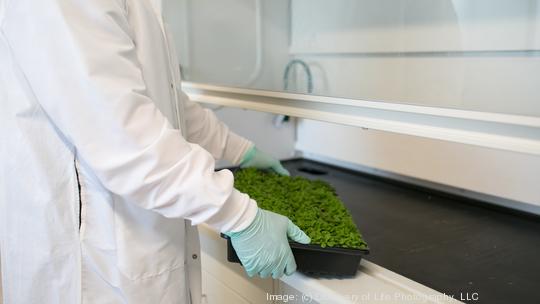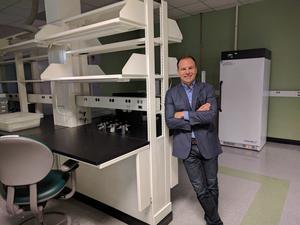
Through a partnership with a global agricultural company, a Durham biotech has set the lofty goal of making crops more resilient to climate change.
Oerth Bio this week announced a collaboration with Yara International, a Norwegian agricultural company with annual revenue of $16.6 billion, to develop products that can make plants more resilient to escalating climate stresses affecting crop production.
"Farmers are dealing with drought, rain heat and cold that they haven't dealt with before," said Oerth CEO John Dombrosky.
Through this collaboration, Oerth will use its research and development platform to discover, build and test molecules that ultimately help farmers' crops survive specific climate-related stressors. The Durham biotech is providing research services in this partnership on solutions that could ultimately lead to commercial products for Yara. But only if the solution is proven to work on the farm.
"The bar for us is ... 'If you're seeing this climate experience condition, you can use this product and it will help your plant survive this stressor,'" Dombrosky said.

This collaboration with Yara is the first major partnership that Oerth has landed since it launched in October 2019. Oerth was formed through a partnership between the German chemical giant Bayer and a pharma company in Connecticut called Arvinas (Nasdaq: ARVN) that's developing a new class of drugs based on targeted protein degradation. By creating Oerth, the two companies wanted to take Arvinas' drug technology and apply it to agriculture to create new crop protection solutions.
Since launching with $55 million from Bayer, Oerth has established a platform to address areas of unmet need within crop protection and set up a headquarters in downtown Durham with 45 full-time employees. Establishing its headquarters in Durham has been one of the most important decisions the company has made, said Dombrosky, who previously led the AgTech Accelerator in Research Triangle Park. This allowed the company to pull talent from local universities and other agricultural companies.
"From facilities and access to amazing talent, there's nowhere else to build the business," Dombrosky said.
Through its initial focus in crop protection, the company is attempting to disrupt what Dombrosky says is a $73 billion market that has lacked innovation for years. The market is also facing regulatory and consumer pressure in response to the chemicals used in some products, as well as pest resistance in crop solutions that have been used for years.
While crop protection is a major focus for Oerth, the company is also trying to address the $100 billion crop efficiency market, which includes its efforts in making plants more resilient to climate change. Just as protein degradation has helped pharma companies pursue what were previously considered undruggable targets, Oerth believes its platform enables the company to address what were previously unattainable targets in agriculture.
It's the company's interest in the crop efficiency market that led to Oerth's collaboration with Yara. And there are likely more collaborations to follow as the company focuses on researching and developing solutions, rather than the commercial side.
'We are a licensing company," Dombrosky said. "We want to focus on what we can be best at."

